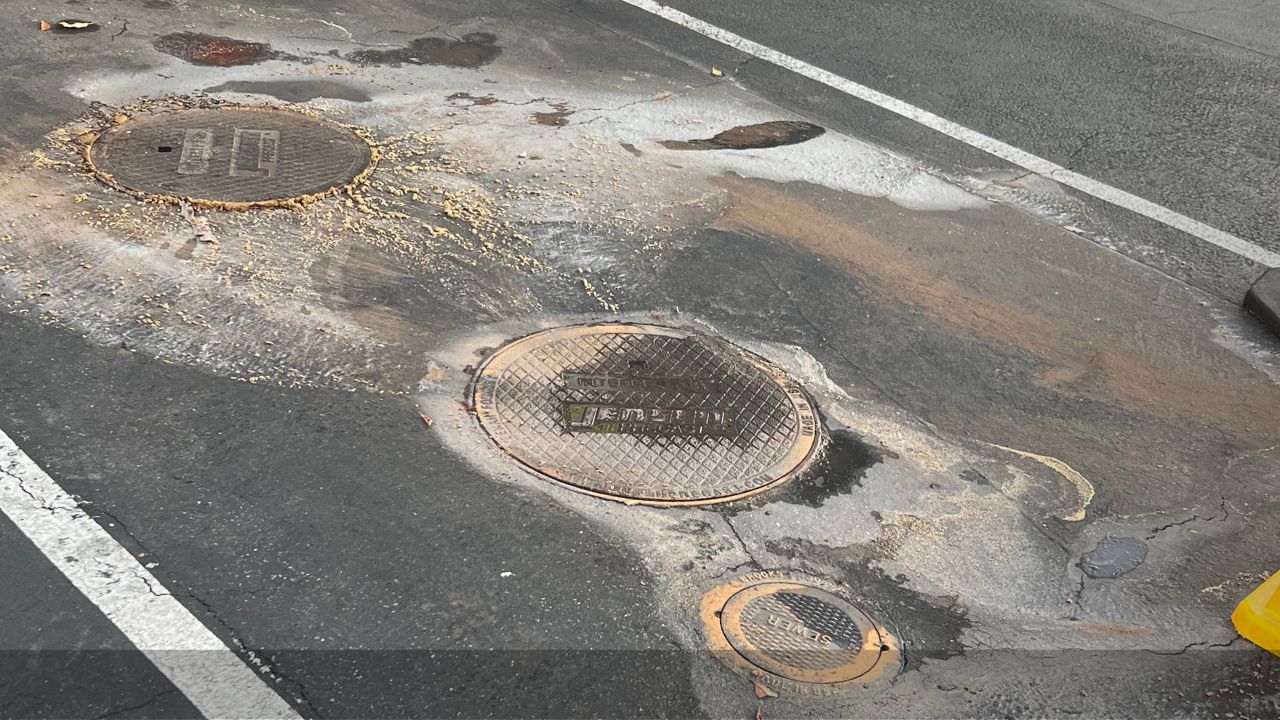
Grease trap pumping is one of the most crucial aspects of restaurant plumbing and, commercial kitchen maintenance. A grease trap- a device that sits silently under the kitchen sink and works efficiently enough to protect the whole plumbing system from different plumbing issues such as kitchen overflows, sewer backups, and many more, is the most important equipment of a commercial kitchen plumbing system. It is designed to intercept most greases and solids before they enter the wastewater disposal system. Over time, the grease trap fills up with grease, fats, and solids and eventually gets clogged up.
Therefore, in many cases- commercial kitchen maintenance refers to grease trap maintenance. Regular maintenance of a grease trap is essential to ensure the effective functioning of a restaurant plumbing system. It involves the removal of accumulated grease, oils, and other debris from grease traps. This complete maintenance process is commonly known as ‘grease trap pumping’.
Timely grease trap pumping is critical to prevent the trap from reaching its capacity, and various operational issues, affect both the kitchen’s functionality and the overall hygiene of the establishment. Let’s look into the importance of regular grease trap pumping and the consequences you may encounter for ignoring grease trap maintenance-
THE GREASE COMPANY
Delaying Grease Trap Maintenance
Neglecting regular grease trap pumping can have severe consequences for commercial kitchens. Some of them are as follows-
Risks of clogs inside plumping pipes: Delayed maintenance of a grease trap heightens the risk of blockages inside plumbing pipes due to the accumulation of solid grease and debris. This build-up obstructs wastewater flow, leading to potential plumbing system errors and the increased risk of different plumbing nightmares.
One of them is- ‘sewer backups’. Yes, Overloading the grease trap with accumulated FOGS raises the potential for sewer backups which lead to backflows into the kitchen or dining areas, causing unsanitary conditions and potential damage.
Formation of Unpleasant Odors: Irregular grease trap pumping contributes to the development of foul odors in and around the kitchen. The decomposition of trapped grease and organic substances generates unpleasant smells, which over time can find their way inside your business facility including the dining area. When you run a food business, the last thing you want for your customer is to lose their appetite due to these bad smells. These foul odors don’t just ruin the work environment but also harm the business’s reputation. Unpleasant smells may drive away customers and tarnish the overall perception of the establishment.
Decreased efficacy of the grease trap: When a restaurant doesn’t pump its grease trap on time, the device often fails to serve it’s basic purpose of separating and trapping grease from wastewater. It allows accumulated grease to bypass the trap and enter the wastewater system resulting in sewer damage and environmental pollution.
IMPORTANCE OF GREASE TRAP SERVICE
The benefits of regular grease trap pumping extend beyond immediate operational advantages, encompassing cost savings, environmental responsibility, and the overall reputation of the commercial establishment. Initiate regular grease trap pumping in your establishment and enjoy the following benefits-
Prevention of Blockages: Regular grease trap pumping helps prevent the accumulation of solid grease and debris, reducing the risk of blockages in the plumbing system. This ensures the smooth flow of wastewater and minimizes the potential for costly plumbing repairs.
Maintained Health: Foul odors are the results of decomposed FOGS, therefore, timely removal of accumulated materials from the sludge tank ensures a clean and healthy environment in the kitchen. This contributes to a more pleasant workspace for employees and a positive experience for customers.
Extended Grease Trap Lifespan: Regular maintenance increases the lifespan and efficiency of grease traps. Timely pumping prevents the trap from becoming overloaded and allows it to continue effectively trapping grease and preventing it from entering the sewer system.
Environmental Compliance: Adhering to a regular pumping schedule ensures compliance with environmental regulations. Proper grease trap maintenance prevents the release of harmful substances into sewer systems, mitigating the environmental impact of commercial kitchen operations.
Cost Savings: Timely pumping helps avoid emergency plumbing situations. Preventing plumbing issues such as pipe blockages and maintaining a well-functioning grease trap reduces the need for expensive plumbing repairs and minimizes disruptions to business operations.
Enhanced Fire Safety: Grease buildup poses a fire hazard in commercial kitchens. Regular pumping reduces the risk of grease-related fires, promoting a safer working environment for kitchen staff.
Positive Business Reputation: A well-maintained kitchen reflects positively on the business. Maintaining hygiene, preventing odors, and avoiding plumbing issues contribute to a positive reputation, attracting customers, and fostering repeat business.
Process of Cleaning A Small Grease Trap
Ensuring that the grease trap is maintained and cleaned properly is essential to prevent drain issues and sewer contamination. A properly functioning grease trap effectively captures grease, fats, oils, and solids, preventing them from entering the main sewer lines and causing blockages or environmental hazards. Failure to maintain a grease trap not only compromises its effectiveness but also poses risks of citations from city officials. Municipalities often enforce strict regulations regarding grease trap maintenance to uphold public health and environmental standards. Therefore, businesses must prioritize regular cleaning and maintenance of grease traps to avoid potential penalties and ensure the safe and efficient operation of their plumbing systems.
- Regular Inspection:
- Schedule routine inspection of the grease trap to assess its condition and determine if it’s time for cleaning.
- Check for any signs of buildup measuring the amount of surface grease and settled solids
- Establish Cleaning Schedule:
- Develop a regular monthly complete cleaning schedule based on the size of the grease trap, the volume of kitchen operations, and local regulations.
- Typically, grease traps should be cleaned at least every 30 days or less, depending on usage and FOGS content.
- Hire Licensed Professionals (To Eliminate and Hassles):
- Ensure that all cleaning and maintenance activities are carried out by licensed professionals.
- Hire a licensed inedible kitchen grease hauler approved by the California Departments of Food and Agriculture to dispose of waste according to regulations.
- Cleaning Process:
- Before starting the cleaning process, ensure that all kitchen operations connected to the grease trap are temporarily halted.
- Wear appropriate protective gear, including gloves and goggles, as grease traps may contain hazardous materials.
- Begin by removing the lid or cover of the grease trap carefully.
- Use specialized tools to scoop out accumulated grease, fats, oils, and solids from the trap.
- Thoroughly clean the interior surfaces of the grease trap using hot water and a grease-cutting detergent.
- Rinse the trap with clean water to remove any remaining residue.
- Inspect the baffles and screens for any damage or signs of wear and replace if necessary.
- Once the trap is clean, reinstall the lid securely.
- Record Keeping:
- Maintain detailed records of all maintenance activities, including cleaning dates, inspection reports, and any repairs or replacements carried out.
- Keep records easily accessible for inspection by regulatory authorities.
- Educate Staff:
- Train kitchen staff on the importance of proper grease trap maintenance and the consequences of improper disposal of grease and waste.
- Emphasize the significance of complying with regulations and reporting any issues or abnormalities with the grease trap promptly.
- Environmental Compliance:
- Ensure that all waste collected from the grease trap is disposed of in accordance with environmental regulations.
- Avoid illegal dumping or improper disposal practices that could harm the environment or lead to fines or penalties.
By implementing a comprehensive preventative maintenance plan for grease traps, businesses can ensure efficient operation, prevent plumbing issues, and comply with regulatory requirements, including proper disposal of waste by licensed professionals.

TGC- A reliable brand for Grease Trap Pumping in Los Angeles, Orange, Riverside, San Bernardino, and San Diego
TGC or The Grease Co. is a trusted name for restaurant plumbing in Southern California. We specialize exclusively in grease trap services and only for commercial kitchens. With over a decade of industry experience and a commitment to customer satisfaction, we offer affordable and effective plumbing solutions for food establishments in Los Angeles, Orange, Riverside, San Bernardino, and San Diego Counties.
We have a team of trained professionals who are dedicated to finding the best solution to any unique problem your grease trap may be having, emphasizing our understanding of the value of each customer’s business. We also understand the value of emergency plumbing for commercial kitchens who work restlessly to provide delicious food to their thousands of hungry customers, and therefore, we’ve made ourselves available 24/7.
We’re everything you commercial kitchen needs. Call us TODAY!
